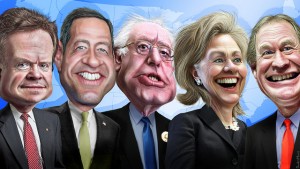
image: flickruser/DonkeyHotey
By Julianne Malveaux
NNPA Columnist
Bye, bye Biden. The Vice-President who might have given the Honorable Hillary Clinton a run for her money has concluded that the timing is not right for him. Clinton needs someone to rattle her cage, to push her to be more focused in the general election. Now, Senator Bernie Sanders will push her to the left. Biden may have pushed her back to center, enhancing her electability.
It doesn’t matter now. The late Congressman William Clay (D-Mo.) often said that black folks should have “no permanent friends, no permanent enemies, only permanent issues.” How hard will African Americans push candidates for President in 2016, whether they are African American or white, Democratic or Republican, legacy candidates (Bush, Clinton), or outsiders? We should directly challenge these candidates on race matters, and push it as aggressively as we can. Hats off to the #BlackLivesMatter movement for doing exactly that – pushing until our issues garnered recognition among Democrats. Republicans were not asked, nor did they volunteer, their perspective on race matters.
If I were questioning these candidates on race matters, here’s what I’d ask about their views:
- What do you think about race relations in our nation? If you think they are broken, how would you fix them? If you think everything is fine, how do you account for the differentials we can measure in terms of income, employment and educational attainment?
- Do you think that race matters? How? Do you think that the Presidential bully pulpit is an appropriate platform from which to raise this issues? Assuming that you are inaugurated in January 2016, what would be your first speech on race, and whom would you offer it to?
- Do you believe in targeted programs? In other words since African Americans were disproportionately hit by the Great Recession, should this community get disproportionate assistance in recovery funding. How would you manage this?
- How do you define affirmative action? Do you agree with its premise and support its implementation?
- The African American unemployment rate has been twice that of Whites for five decades. Do you feel any obligation to close the gap? How would you approach that? Too many have accepted this employment gap as historic. Should the African American community accept this as a permanent gap?
- How would you deal with some of the educational challenges in the African American community, from differences in high school graduation rates, to differences in college attendance? Would you increase the Pell Grant, and where would the money come from? How strongly will you support HBCUs (Historically Black Colleges and Universities), and can these institutions expect more support from your administration?
- The criminal justice system seems biased against African Americans, and the recent spate of the killings of black men at the hands of white officers magnify this. What are your plans to reform a system that is so clearly biased that half of prison populations are African American (yet only 13 percent of the population)?
- African Americans disproportionately depend on Social Security, mainly because as few as a third have company provided pensions. Calls for Social Security reform have included proposals to cut benefits, raise the retirement age, or both. What is your position on Social Security changes? How do you think African Americans are affected by these changes? What will you do to mitigate the disproportionate impact of social security changes on African Americans?
- Who are the African Americans on your campaign team? What are their roles? Will you contract with African American entrepreneurs to do your printing, or media buys and to provide other services? Do you have a goal for what percentage of your campaign budget will be awarded to African American businesses?
- Do you support the Affordable Care Act, which increases health insurance availability for African American, as well as all Americans? If you do not support the Affordable Care Act, how will you improve health access?
Historically, African Americans heavily support Democrats, and from what I see in the Republican field, we should continue to do so. However, Democratic candidates should not take the African American community for granted and those Democrats in the race should be willing to answer these questions.
Hilary Clinton enjoys significant support among African Americans. Our support should not excuse her from asking questions about her support of African Americans. If we don’t ask her these questions, we have no right to ask them of others.
Julianne Malveaux is an author and economist based in Washington, D.C. Her latest book “Are We Better off? Race, Obama and Public Policy” will be released in November 2015 and is available for preorder at www.juliannemalveaux.com.




